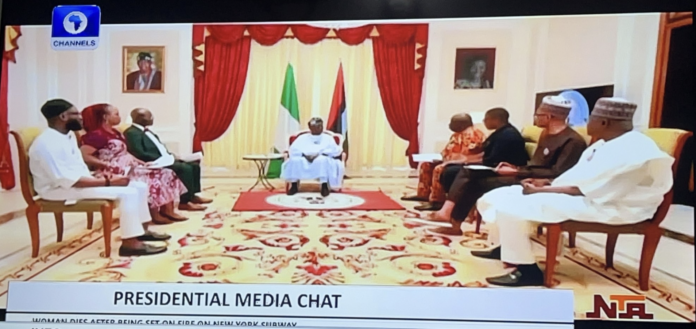President Bola Tinubu has made it clear that he has no regrets about removing the fuel subsidy, stressing that it was a necessary step for the future of Nigeria.
During his first presidential media chat, which was broadcast across the country, Tinubu strongly defended his decision to end the subsidy on fuel importation.
He explained that, under the subsidy scheme, Nigeria was essentially borrowing from future generations without making the necessary investments to secure the country’s economic future.
“We are spending our future. We are spending our generation’s fortunes. We are not investing. We are just deceiving ourselves,” Tinubu said, addressing the critical issue of national debt and the economy’s long-term sustainability.
The president’s comments come after months of protests and criticisms following the removal of the subsidy, which saw fuel prices soar across the nation. Many Nigerians have faced hardship due to increased fuel costs, and opposition voices have argued that the government’s action was too harsh on the average citizen.
However, Tinubu remains resolute in his stance. He argued that the continued fuel subsidy was unsustainable, saying, “Why should you have expenditures when you don’t have revenues?”
He further warned that, without reform, the country would be headed for a “slippery slope” towards a financial disaster.
“We have no choice. Otherwise, we are headed for the slippery slope… financial disaster, not just for us but our children,” the president stressed.
Background on Fuel Subsidy and Economic Impact
The fuel subsidy in Nigeria had been a longstanding issue. Over the years, it became a massive drain on government finances, with the country spending billions of naira annually to subsidise fuel prices. Despite being one of the largest oil producers in the world, Nigeria’s fuel prices were kept artificially low due to the subsidy. This had created a situation where the government was paying more than it could afford to keep fuel costs low, while the country faced an increasing budget deficit.
The fuel subsidy was a hotly debated policy issue, with critics arguing that it benefited the wealthy more than the poor and discouraged investment in the oil sector. On the other hand, supporters of the subsidy claimed that it provided a necessary relief for ordinary Nigerians struggling with high living costs.
However, as the country grappled with rising inflation, economic challenges, and a rapidly growing population, President Tinubu argued that the subsidy was no longer sustainable.
The removal of the subsidy has led to significant changes in the cost of living for Nigerians, as fuel prices have increased, pushing up the cost of transportation and goods. Many Nigerians have struggled to cope with the higher prices, leading to widespread dissatisfaction.
President’s Response to Palliatives Stampede Tragedy
Tinubu also addressed the recent tragedy in which several Nigerians died in stampedes during palliative distribution events across the country. The president expressed his deep sorrow over the loss of lives and blamed the deaths on poor organisation.
“It is very sad that people are not well organised. We just have to be disciplined. My condolences to those who lost their family members,” Tinubu said, referring to the chaotic scenes that unfolded during the distribution of government aid meant to alleviate the impact of the subsidy removal.
The incidents, which occurred in different parts of Nigeria, highlighted the challenges of managing relief efforts in a country with such a large and diverse population. Critics have pointed to the lack of proper planning and resources as a major factor contributing to the tragedies.
The deaths have sparked outrage among Nigerians, with many questioning the government’s preparedness in managing such large-scale operations.
Tinubu’s First Media Chat and Future Plans
Tinubu’s remarks came during his first-ever presidential media chat, which aired on Monday, December 23, 2024. The chat was broadcast on national television and radio stations across Nigeria, providing the president an opportunity to address key issues facing the country, including fuel subsidy removal, economic reforms, and national security.
Bayo Onanuga, Special Adviser to the President on Information and Strategy, had earlier confirmed the details of the media chat, noting that the president would answer questions about Nigeria’s socio-economic challenges.
The chat was widely anticipated, as many Nigerians hoped to hear the president’s perspective on the many pressing issues facing the country. From the worsening economic situation to the fuel subsidy removal and the deadly stampede incidents, Tinubu’s responses were expected to provide clarity on his policies and future plans for Nigeria.

